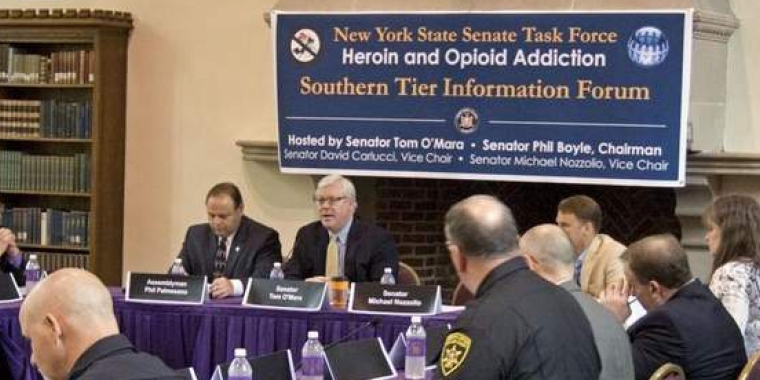
O'Mara sponsoring legislation to strengthen state-level responses to the heroin crisis ~ Will sponsor a Senate Task Force on Heroin forum in Yates County on February 23

Senator O'Mara serves on the Senate Task Force on Heroin, which will hold a hearing in Penn Yan on February 23.
Elmira, N.Y.—State Senator Tom O’Mara (R,C,I-Big Flats), a member of the Joint Senate Task Force on Heroin and Opioid Addiction, is co-sponsoring a series of legislative measures aimed at combating the heroin epidemic spreading throughout the Southern Tier and Finger Lakes regions, and statewide.
The legislative package seeks to build on existing state-level laws, programs and services enacted over the past few years in Albany to strengthen awareness, education, prevention and treatment efforts.
But it also takes aim at heroin traffickers and dealers.
It includes legislation (S4163) to allow law enforcement to charge a drug dealer with homicide, a class A-1 felony carrying a penalty of 15-25 years in prison, if a person dies of an overdose of heroin or other opiate-controlled substance sold by that dealer. The measure targets mid- to high- level drug suppliers who profit from heroin sales.
“Awareness and education, prevention and treatment are fundamental responses. But so are tough laws and law enforcement, especially when it comes to heroin traffickers and dealers. I agree that we can’t arrest our way out of this crisis, but we shouldn’t hesitate to throw the book at the pushers and suppliers of this deadly drug,” said O’Mara.
[at bottom of this page, see the attached article from this morning's Corning Leader, "Homicide charge for heroin dealers?", and see more on WENY-TV, "Senator O'Mara Co-Sponsors Legislation to Tackle Heroin Epidemic"]
Other pieces of legislation O’Mara is co-sponsoring, many of which have bipartisan support in the Legislature, include measures to:
- target the “heroin pipelines” existing throughout New York State (S608), including regionally where local law enforcement agencies note that much of the heroin trafficking invading area communities originates out of the city of Rochester. This legislation would establish a new felony crime of unlawfully transporting of opiate-controlled substances within the state, regardless of weight, and give law enforcement an additional tool to prosecute dealers, especially those who travel from county to county to increase their profits. The lure of higher profits incentivizes many dealers, especially from big cities like Rochester and New York City for example, to travel far distances to sell heroin at higher prices in rural and suburban areas;
- expand the crime of operating as a major trafficker (S4177) to more accurately reflect the nature of the criminal enterprises and increase successful prosecutions. The bill recognizes the low street prices of heroin by lowering the minimum required proceeds from the sale of controlled substances during a 12-month period from $75,000 to $25,000;
- facilitate the conviction of drug dealers (S100) by allowing someone to be charged with a felony crime of intent to sell if they possess 50 or more packages of a Schedule I opium derivative, or possess $300 or more worth of such drugs. Under current law, dealers can carry large quantities of the drug before triggering a felony charge of possession;
- preventing the sale of synthetic opioids (S1640) by expanding the list of controlled substances in schedules I, II, III, IV, and V to include any controlled substance which is intended for human consumption and is structurally or pharmacologically substantially similar to, or is represented as being similar to heroin, opium, or other opioid-based narcotic. This would help combat the quickly-moving world of designer drugs; and
- establish assisted outpatient treatment for substance use disorders (S631). Courts would be enabled to order assisted outpatient treatment (AOT) for an individual with a substance use disorder who, due to his or her addiction, poses a threat to him or herself or others.
Recently O’Mara announced that he will bring the Senate Task Force on Heroin to Yates County for a forum on the regional crisis. The hearing will be held on Tuesday, February 23rd in the Penn Yan Middle School Auditorium at 515 Liberty Street, beginning at 6:30 p.m.
O’Mara said, “I look forward to hearing directly from those on the front lines locally who can help us keep targeting the necessary responses. We need to keep working, at every level of government, to try to keep our laws, programs and services ahead of this public health crisis. We can’t let up for one second on the alarming threat of heroin, opioids, meth, synthetic substances, bath salts and other illegal drugs spreading throughout our communities. In particular, the growing heroin crisis is far too great a risk to spiral out of control and overwhelm individual lives along with local systems of health care, law enforcement, criminal justice and social services.”
The forum, which will be open to the public, will feature a panel of regional law enforcement officers, treatment professionals, recovering addicts and family members, social services and mental health professionals, and other experts about the range of complex challenges posed by heroin including addiction prevention and treatment options, awareness and education, drug-related crimes, and other community and public safety impacts.
The bipartisan Senate task force was created in 2014 at a time when local police departments and addiction centers, including many across the Southern Tier and Finger Lakes regions, were pointing to the alarming rise in the availability and use of heroin. O’Mara sponsored a task force hearing at Elmira College in early 2014.
He said that since that time, while the work of the Senate task force has helped to enact important new state-level laws and other responses, the heroin crisis has grown increasingly urgent and continues to spread across the region, as well as throughout New York State and the nation. Consequently, task force members are continuing to develop legislative recommendations for combating, preventing and treating the drug’s spread.
In addition to the Penn Yan forum, the task force has also scheduled additional hearings throughout the state.



